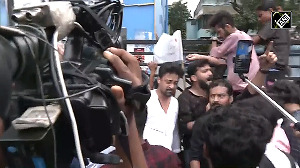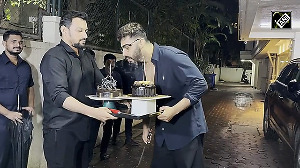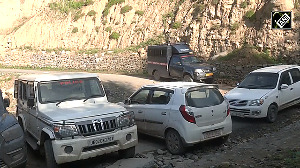Dr Anil Kakodkar, chairman of India's Atomic Energy Commission, and his agency was the 600-pound gorilla in the room that vetoed the compromise language on the stalled bilateral civilian nuclear cooperation accord (known as the 123 Agreement), according to senior administration officials and diplomatic observers in Washington, DC.
The agreement was worked out between the Ministry of External Affairs officials led by Dr S Jaishankar (former joint secretary, Americas, and currently India's high commissioner to Singapore), and Dick Stratford, director of US State Department's Office of Nuclear Security and Cooperation.
These sources told rediff.com that this was the reason Under Secretary of State for Political Affairs Nicholas Burns, the chief US interlocutor of the US-India civilian nuclear agreement, had put off his visit to New Delhi this week because "he did not see any sense of going to Delhi if the agreement was not completed for signature."
"Nick felt it was not worth for him to make the trip," one source said.
However, the sources said that Burns was still hoping to make it to Delhi before the month was out or in the first week of June, before President George W Bush and Prime Minister Manmohan Singh meet on the sidelines of the G-8 Summit in the German resort town of Heiligendamm, to see if the agreement could be finalised as had been expected earlier when Foreign Secretary Shiv Shankar Menon visited Washington and met with Burns on May 1, so that the two leaders could celebrate its completion after months of it remaining in limbo.
According to the sources, Burns' trip would depend on renewed negotiations between Jaishankar and Stratford in London since Monday in the wake of the AEC's opposition to the language worked out during an exchange of texts between Delhi and Washington following the Menon-Burns summit earlier this month, that had sent both sides scrambling back to the drawing board.
There was however optimism in the State Department that the language could be finalised this time around because Jaishankar had been accompanied by a senior AEC official who had the authority to give his stamp of approval if the language alleviated the scientific establishment's concerns.
Even though during the summit between Menon and Burns on May 1, the two negotiating teams led by Jaishankar and Stratford had worked out a compromise language and watered down the agreement significantly in terms of not including some of the contentious issues with regard to reprocessing of spent fuel and testing, Kakodkar and his AEC team had found the language wanting and were holding out for iron-clad assurances that non-inclusion wouldn't mean that these issues could still come back to haunt them and that the US at a later date could suspend nuclear fuel supplies and sanction India in case of it using its sovereign national security prerogatives to either reprocess or test.
Kakodkar and the scientific establishment "want commitments that these would not become issues later on that could impinge on India's nuclear programme," one source said and added, "in the current political climate (apparently referring to Congress' poor showing in the UP elections), obviously the Indian government doesn't want there to be any perception -- fueled by Kakodkar and others, besides the opposition -- that there has been some kind of sell-out of India's national interest under unrelenting US pressure."
Immediately after the Menon-Burns meeting on May 1, the State Department put out a statement saying, "The discussions were positive and the US is encouraged by the extensive progress that was made
We look forward to resolving the outstanding issues in the weeks ahead," it added, and noted that "in that regard, Under Secretary Burns will visit India in the second half of May to reach a final agreement."
But last week, when reporters who had been privately informed that Burns would be in Delhi on May 21 to sign the agreement, questioned State Department spokesman Sean McCormack on Burns' visit, the reply was, "When we are ready to seal the deal and we are not at that point yet."
He refused to give a timeline as to when Burns' would get out to Delhi, only saying, "Nick's going to do what he thinks is appropriate and most effective in order to get a deal done. And at what point he travels to India, he is going to make that call. But he is going to do what he thinks is most effective to getting a deal."
"I very rarely apply timelines to diplomacy because it inevitably proceeds more slowly than we would normally like. Sometimes we are surprised by that," McCormack said.
On May 23, Burns was slated to keynote a conference organised by the Heritage Foundation -- a leading conservative think tank in Washington -- and the Federation of Indian Chambers of Commerce and Industry titled 'US-India Relations: The Road Ahead,' but beyond the predictable remarks on the progress of US-India relations in recent years, he did not discuss the nitty-gritty of the negotiations of the 123 Agreement and if finally a deal had been sown up between Jaishankar and Stratford, with the supervising AEC official as the referee regarding the scientific establishment's concerns.
Meanwhile, Ambassador Ronen Sen, a major stake-holder of the envisaged US-India strategic partnership who has been pushing for the completion of the 123 Agreement and final consummation of the deal, who had been granted an extension till August this year after his two-year term expired, was expected to stay on till March of 2008.
One observer commented that "obviously, you can't help but understand that he (Sen) wants to see through this deal on his watch, because after all he was one of the key players in pushing for this agreement."
"This is something, understandably he wants to see through while he is here (in Washington) and not return before it is completed because surely he doesn't want to be remembered only for the mango deal (between the US and India, where mangoes could be exported by India after 18 years) that happened during his watch," the observer added.





